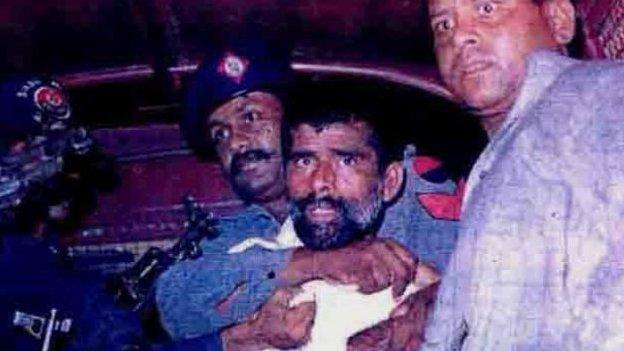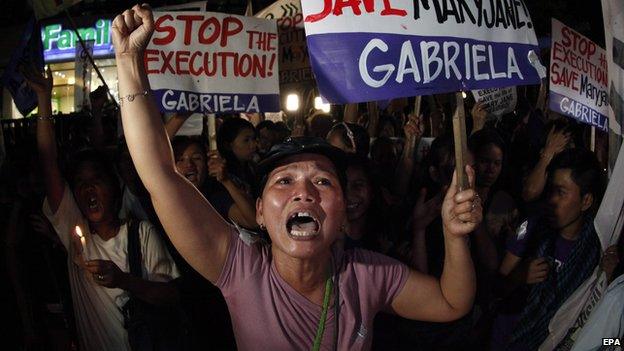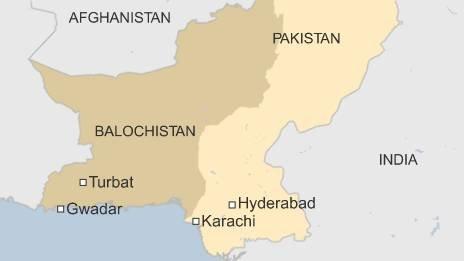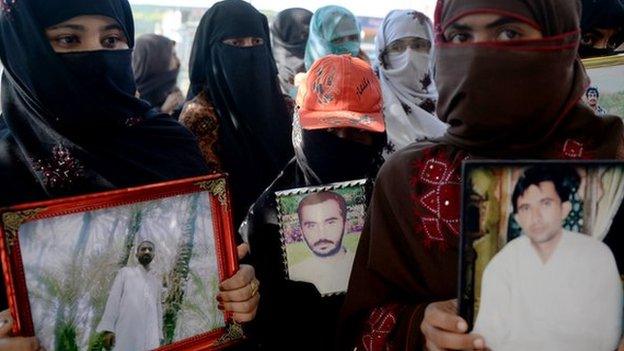Pakistan hangs Baloch insurgents behind 1998 plane hijacking
- Published

Two of the hijackers were pictured being taken away by police after they stormed the plane
Pakistan has hanged three Baloch insurgents, 17 years after they hijacked a passenger plane with 30 people on board.
The men were executed at jails in Karachi and Hyderabad.
They hijacked a Pakistan International Airlines flight in May 1998, external and ordered the pilot to fly to India but the plane was diverted and stormed by troops.
Pakistan has put at least 130 people to death since lifting a moratorium on executions in December.
The men - Shabbir Rind, Shahsawar Baloch and Sabir Rind - were members of the left-wing Baloch Students' Organisation (BSO), who were demanding more resources, such as gas and electricity, for their region.
Death sentence
They were sentenced to be executed in October 1998 but remained on death row until a moratorium on executions was lifted after the Peshawar school massacre.
Four other men were hanged on Thursday at jails across the country. They were convicted in murder cases and were not linked to the hijackers.
PIA flight 554 took off from Turbat, in the south of Balochistan, and was heading for Karachi when the attackers boarded during a stop-over in Gwadar.
They commandeered the Fokker shortly after take-off, and demanded the captain fly directly to Delhi.
He told them there was not enough fuel, but agreed to bring the plane as far as Bhuj, an airstrip in Gujrat, India.
Instead, he landed in Hyderabad where security forces were waiting.

Executions around the world

Thousands of people protest against the death penalty every year
According to Amnesty International, external, Pakistan has executed 139 people since December 2014 - 132 were carried out this year
Figures for executions in other countries in 2015 are not yet available
By the end of 2014, the countries with the highest number of reported executions were: Iran: 289, Saudi Arabia: 90, Iraq: 61, USA: 35, and Sudan: 23
In 2013 the numbers were: Iran: 369, Iraq: 169, Saudi Arabia: 79, Somalia: 68, USA: 39
China and North Korea refuse to divulge information on the number of executions that take place within their borders

BBC Urdu's Riaz Sohail in Karachi reports that in order to let the hijackers think they were in India, authorities banned the use of loudspeakers in mosques around the airport.
Troops then stormed the plane and overpowered the hijackers. Passengers and crew were unharmed.
The hijacking on 24 May came just four days before Pakistan carried out nuclear tests in Balochistan, which the BSO opposed.
The province is one of the most underdeveloped regions in the country and has become the site of a long-running conflict between separatists and security forces.

- Published22 February 2014

- Published1 June 2011